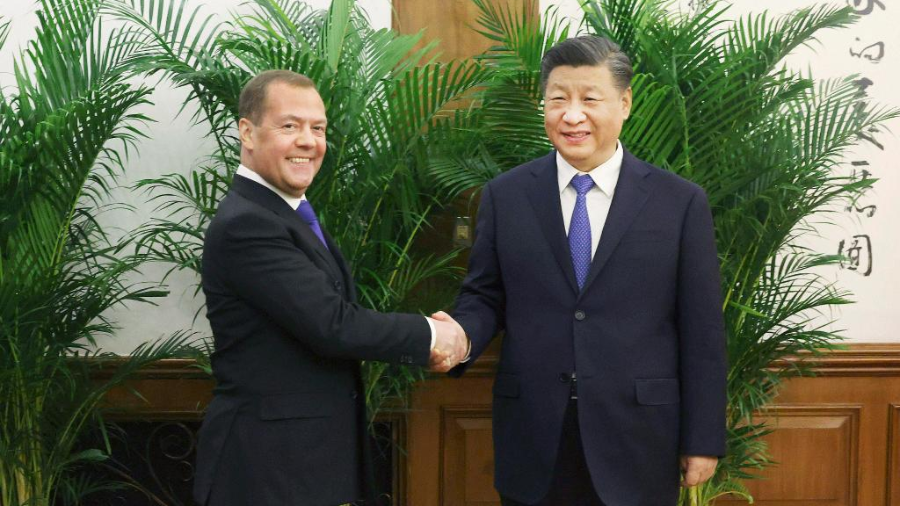
Chinese President Xi Jinping meets with Chairman of the United Russia party Dmitry Medvedev at the Diaoyutai State Guesthouse in Beijing, capital of China, December 21, 2022. [Photo/Xinhua]
By Andrew Korybko
Chinese President Xi Jinping met with former Russian President Dmitry Medvedev, who presently serves as the Chairman of the ruling United Russia party, in Beijing on December 21. They praised the importance of continuing their historically close cooperation in order to advance their mutually beneficial aim of gradually reforming international relations with a view toward making it more democratic, equal, and just.
The Chinese president hailed China-Russia ties, saying that over the past decade, bilateral relations "have stood the test of the volatile changes in the international landscape and maintained healthy, steady and high-level development."
Receiving a message from Russian President Vladimir Putin passed along by Medvedev, President Xi also asked Medvedev to convey kind regards back to Putin, noting that developing a comprehensive strategic partnership of coordination is "a long-term strategic choice from both sides based on their respective national conditions."
Continued China-Russia coordination is integral at this point in the global systemic transition, which predates this year's dramatic events but was unprecedentedly accelerated by them. The U.S.-led West's prior unipolar hegemony is declining in the face of rising multipolar countries like China and Russia, both of which serve as the engine of contemporary multipolar processes. Their economic, financial, logistical, military and political cooperation maintains the course of those aforementioned processes.

A model plane is on display at the Russia pavilion during the second China International Import Expo in Shanghai, east China, November 6, 2019. [Photo/Xinhua]
In practical terms, the China-Russia comprehensive strategic partnership is making international relations more democratic, just and equal through global governance reform, the pioneering of mutually beneficial partnerships with third countries, and de-dollarization. The first is advanced via their shared vision of global affairs as expressed at the UN; the second is driven by China's Belt and Road Initiative and Russia's "Greater Eurasian Partnership," and the third is through the use of national currencies.
Taken together, these three pillars of their strategic cooperation have already had a major impact on global affairs. The U.S. was unable to legitimize its anti-Russian sanctions at the UN Security Council, which therefore makes them illegal under international law. China and Russia's comprehensive investments across Eurasia have strengthened their partners' resilience to the U.S. economic pressure, as have their policies of de-dollarizing bilateral trade through the use of their respective currencies.
The U.S.'s prior unipolar hegemony was disproportionately maintained through its hijacking of global governance institutions and weaponization of the dollar, both of which China and Russia are gradually eroding through their strategic cooperation with one another. This insight adds credence to the previously mentioned observation that those two are the engine of contemporary multipolar processes since the latter couldn't have accelerated at its present pace had it not been for their coordination.
That being the case, Western commentators are wrong to regard these developments as being against their countries' interests. The emerging multipolar world order is irreversible so it is best for them to find their place within it as soon as possible instead of trying to violently reverse these processes in vain. Resisting the inevitability of these associated processes reaching their ultimate conclusion will only result in harming innocent people, including their own's living standards through self-inflicted crises.
After all, it's already the case that the EU is suffering a much worse rate of inflation than Russia despite their governments' compliance with the U.S. sanctions being intended to worsen their target's economic standing. President Putin confirmed this at a meeting with the Council for Strategic Development and National Projects on December 15 when revealing that "In November, inflation in the eurozone averaged 10 percent. Some countries recorded exorbitant figures of more than 20, 21 and 25 percent."
With this in mind, Western societies should encourage their representatives to recalibrate their policies so that they're more responsibly directed toward improving their people's living standards. To that end, the West's illegal sanctions should be rescinded, its economic cooperation with China and Russia enhanced, and those two's joint progress on accelerating multipolar processes celebrated for advancing the noble cause of making international relations more equal, democratic and just for all.
Andrew Korybko is a Moscow-based American political analyst.

 中文
中文



